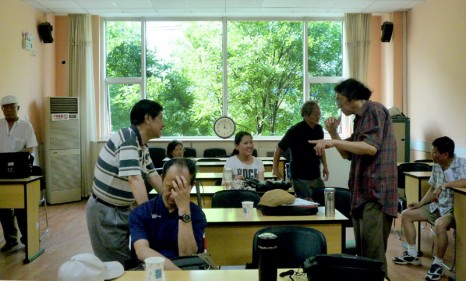a mini workshop on stamp collecting. we had previously debated for a long time about the proper chinese translation for the english word ‘workshop’, as the 工作坊 we had been explaining up till now is moreso a place, not the class-event type of scenario we are imagining. 讨论会 (more like conference), 手工课 (too childish), 实践课 (hmm…), 实习课 (more like a theoretical-to-practical training) …we finally settle upon 技艺班, perhaps something not unlike what they are doing here. in preparation of the fall stamp exhibition, Mr. Ren is giving a mini workshop on stamp collecting. everyone here is deaf, except for one participant, who is blind. there is a sign language translator who tells the blind man what Mr. Ren is lecturing: different types of stamps and ways of collecting. For the blind man, perhaps this workshop is moreso a one-to-one conversation. Not being able to participate in the context of the classroom lecture-style atmosphere, he naturally responds to the translator. For him this workshop is simply conversation. He starts to tell the translator about the stamps in his collection: one for the Hong Kong 回归 return-to-China commemoration, and another for the celebration of Macau’s return. He is only waiting for Taiwan’s return to China so that he can collect that commemorative stamp, too. The translator has stopped translating now, as it should also only be so natural for him to respond when one addresses him.
“It’s not the same situation, Taiwan won’t return to China like Hong Kong or Macau. Hong Kong was part of the British, Macau was Portuguese. Taiwan is from the Kuomintang, they are independent.”
“What are you talking about? We are all Chinese people. Of course we all want to be united.”
They bicker for awhile, completely outside of the signed conversation that ensues all around them in the classroom. The lesson on stamp collecting is, at the same time, oblivious to the discussion of a blind man and his translator. There are several identities being formed here. All our efforts are in the name of some kind of collecting of some sort. Our disabilities, our hobbies, an entire race of peoples. “Of course we all want to be united.” But when some of us are blind, and some are deaf? There are very few translators, and among all of these very few of us even ever know which one we are.
You must be logged in to post a comment.

‘we all want to be united’
is that so? unity, being one together, erasing the differences or finding the similarities. what about the onces that don’t fit in any unity?
does the sense of inside and outside make you feel more united?
oh so interesting! these coexisting spheres of exchange and different ways of access, no interference..
i think we should look more into ranciere and the distribution of the sensible, seems quite fitting in this context..
what about the translators? are they needed to “unite us”? (aren’t we all translators anyway?)
and aren’t our disabilities, the fact that some of us are blind and some of us are deaf, bringing us more together, even as they keep us apart? i can lend you my ears and you can lend me your eyes..
hmm..
i would like to listen to the blind man describe his stamps..
we touched on this a bit already, but it is something to remember, anyhow, that perhaps unity is not ‘sameness’, and neither does it negate the possibility of ‘exchange’.
you are right that our roles are not so fixed, we are more likely to take up all three positions of the blind and the deaf and the translator at different modes in life, but it is probably more often that we don’t know how to access the other at any one time…
tell more about ranciere!
Terica Kodera
I found a great…